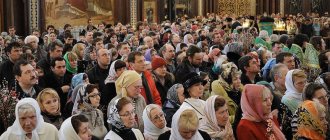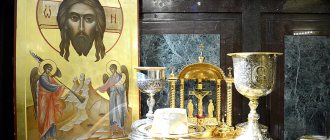How to go to church for the first time, how to behave when entering?
The Church is a special world, where there are its own rules and orders. That is why people visiting churches and temples must adhere to strict standards of behavior. This is frightening for those who have not previously attended church or attended rarely. Nevertheless, you need to go to it and therefore you should familiarize yourself with the main nuances of an Orthodox church, whether on pre-holiday or ordinary days.
IMPORTANT: If you visit the temple of God during the holidays, you should know that on this occasion you should come to the church much earlier than the service begins. The service times are usually written on the church doors so that everyone knows.
Men and women must attend in clean and neat clothing. It should not be expensive and elegant, but its neatness is a sign of respect for the Lord and His home (church, temple). A man should wear a shirt and trousers that can cover his arms and legs (preferably). Therefore, avoid short-sleeve T-shirts, T-shirts and shorts . Also, to church you should not wear clothes that are too bright or with provocative bright patterns, inscriptions, holes, or cuts.
- A man should not cover his head; on the contrary, he should take off any panama, cap, cap or hat.
Women should wear modest clothing to church that covers their figure and is not tight. Be sure to hide your chest and shoulders, and cover your legs with a long skirt (the shortest skirt should be no higher than the knees).
- The most important thing that women need to wear is a headscarf..
The fact is that a woman’s covered head in a temple is a sign of respect to the Lord, because he is the owner of his house and therefore, when entering the church, one must obey his rules.
IMPORTANT: Women should not attend church during menstruation and at a time when blood is still being released after childbirth. Such a violation will show your disrespect for the Lord and desecrate the church.
Before you approach the temple, you should:
- Stand in front of its main entrance, look at the cross (it should be located on the doors or gates) and cross yourself three times, bowing each time.
This is a kind of greeting with the Lord and a sign that you are an Orthodox person.
- After you overcome the entrance doors, you do not immediately find yourself in the church, but in the vestibule - a special place in the form of a small corridor. Here you should cross yourself three times again and only then go into the church hall itself.
About the rules of conduct
How to venerate icons
Just coming to church and venerating the holy image is not enough. In Orthodoxy there is a whole ceremony of applying to the divine faces:
- approaching the icon, they make the sign of the cross twice;
- they are applied with their lips to the lower corner of the shrine;
- at the end, they cross themselves again and move away, so as not to delay the queue of those wishing to touch the image.
However, there are icons that are exceptions to the generally accepted rules:
- waist - kiss the hand of the saint;
- crucified Christ - kissed at the feet of the Savior;
- miraculous images - hair is revered.
A woman should have her head covered in the temple
Candles for health are usually placed in any candlesticks.
Reverence before the holy image
Where is the best place to stand in church?
The meaning of an Orthodox person is to glorify the Lord. That is why he goes to church and in prayerful communication tells God about his problems, successes, doubts and fears in order to find the only important solution and help. If you come to the temple in advance (15 minutes before the start of the service), you should light candles or write special notes for the service.
You can take absolutely any convenient place in the church that you like in the hall. There is only one main rule to follow (it is not always and not always observed) - during the service, women should stand on the left, and men on the right. If you find a lot of free space in the hall, it is important not to stand where the main aisle is.
IMPORTANT: Remember, the place you occupy should be yours only until the end of the service. Walking around the church and changing your place is not allowed. You also cannot loudly greet friends and relatives, talk to them, or distract others present from prayers.
You can also take a seat in the temple. There are always special benches in the church, but they are needed only for those who cannot stand for a long time due to health reasons or poor health (sick people, people with missing or damaged lower limbs, small children and older people). You should sit on the lavas modestly, without spreading or throwing your legs.
In any case , try to behave discreetly in church , without putting your hands in your pockets, putting them behind your back or folding them across your chest.
You need to stand in the temple because in this way you appear before God, opening your heart and soul. It can also be considered that the vertical position of the body elevates human destiny.
Where to stand in church?
Recommendations
In order to get maximum spiritual satisfaction from going to church, it is worth understanding what needs to be done during the rituals and services performed by the priests.
Behavior during service
It is not recommended to enter the temple during the service; it is better to come to the House of the Lord in advance, light candles before the service and submit the necessary notes:
- During the service, you cannot talk to neighbors or communicate on the phone.
- Standing with your back to the priest or the altar is strictly prohibited.
- It is also forbidden to leave the church until the service is over.
- During the service, it is not recommended to move around the temple, light candles, or give notes.
- All parishioners must stand during the service. The exception is people who feel unwell or have chronic diseases.
Advice! If, when going to church, you are overcome by doubts about the correctness of actions and behavior, contact a clergyman, who will definitely tell you what and how to do.
During communion
The Sacrament of Communion is celebrated after the end of the Sunday morning service:
- It is not recommended to eat food before Communion.
- The Sacrament begins with infants and toddlers. Only after giving communion to the children does the priest move on to the adult parishioners.
- At the moment of the Sacrament, the parishioner crosses his arms on his chest, clearly states his name and opens his mouth to receive the holy gifts.
- After accepting the gifts, the parishioner kisses the edge of the Holy Chalice, crosses himself and venerates the cross in the hands of the priest.
- The communion ends at a special table, where it is necessary to sip Cahors.
After the end of the Sacrament, parishioners are allowed to approach the icons and light candles.
About the sign of the cross
The sign of the cross is appropriate in front of icons, holy relics, during services, church hymns and sacraments. Also, parishioners cross themselves when entering and leaving the temple.
How to venerate icons
For an Orthodox Christian, an icon is a conductor through which prayers and requests reach the Lord. After reading the prayer, the parishioner makes the sign of the cross twice and touches the edge of the icon, first with his lips, and then with his forehead, and bows from the waist. After these actions, the believer once again makes the sign of the cross.
Important! If a woman visited a temple with lipstick, then before bowing to the holy face, the cosmetic product is removed.
Entrance and exit from the church
When entering and leaving the temple, you must also follow some rules:
- Before entering the church grounds, the sound on the phone is turned off.
- Before the gate they worship and cross themselves three times.
- Women must cover their heads with a headscarf, headscarf or scarf.
- Men, on the contrary, take off their headdress.
- Upon entering the church building, you must again bow and cross yourself.
When leaving the temple, you must stand facing the entrance, bow and make the sign of the cross. You need to come to church in a calm mood, good mood and pure thoughts.
Interaction with priests
If you manage to meet a clergyman on the territory of the temple or in the building of the House of the Lord, then you should ask the priest for his blessing, and only then start a conversation or ask questions of interest. The next time you meet with the priest on the same day, the blessing is no longer required. Also, parishioners approach the clergyman for a blessing even after the end of the service.
Alms
Many parishioners mean money as alms, but this approach is wrong. Charity is about good intentions to help another person. Therefore, you can give food, any clothes, or say kind words of support as alms.
Important! The main thing is that all the actions of a believer come from the heart and do not cause regrets about what they have done.
How to behave in church and temple during services, what to do, how to be baptized?
As already mentioned, if there is a service in the church, you should come to the temple in advance. Any Orthodox holiday or important day (such as Sunday) requires an Orthodox person to be neat and tidy. You should choose modest but beautiful clothes: clean, ironed, light-colored. You should also comb your hair and wash your face. Women should not apply a thick layer of cosmetics; avoid it altogether or use very minimal amounts.
Modest dressing requires modest behavior . Be as welcoming, joyful and happy as you come from visiting church.
One should be baptized before entering the church, in the narthex and in front of the images.
- If you are at a service, listen to the prayers and watch the clergy. Cross yourself every time one of them begins to cross yourself , even if you cannot clearly make out the words.
IMPORTANT: An Orthodox person always crosses himself by putting all the fingers of his right hand into a handful. Touch your forehead with your fingers, then your stomach and only then your right and left shoulders. In this way, you “draw” the cross of the Lord on yourself, blessing and cleansing yourself.
How to be baptized?
Church etiquette in church
It is not allowed to behave loudly and noisily in the temple, to walk with your hands in your pockets, to chew, or to disturb other believers during their prayers. When meeting with acquaintances, you can greet each other with an Orthodox kiss, and postpone conversations until you leave the temple.
When we come to church, we always want to join the Christian ritual and make a small sacrifice - a candle. There is no specific order in which candles should be placed. You can put a candle to the icon of the Saint to whom you want to pray.
If you approach a candlestick and do not find any free space, you do not need to put out other people’s candles; there are special employees for this. You need to wait a bit for space to become available.
If you see that your candle has not yet burned out, but it has already been extinguished by a church minister, do not be embarrassed. Your sacrifice is accepted by God. You should not listen to various superstitions. The candle has a symbolic meaning.
How to behave in church and temple during confession?
Confession is a special church sacrament, during which an Orthodox person tries to “open his heart and soul” to the clergyman and ask the Lord for forgiveness for his sins. People who have never confessed to God are always worried because they don’t know how to behave, what to say and what questions to ask.
Many church ministers call this sacrament “second baptism,” because during repentance a person’s soul is cleansed .
You should “cleanse your soul” when you feel the desire to do so. Human nature is considered weak and due to weakness, people commit sins even after repentance, which alienates them from God.
Repentance and confession are a necessity for the salvation of the human soul. It is important to learn for yourself that only sincere recognition of sins will allow you to get rid of them, throwing off the “stone” from your soul. When telling your father about your life, remember everything from your early years.
It is known that only those people who admit to all their sins can go to Paradise.
- While you repent, do not be afraid to appear funny, lost, and in no case be ashamed of your words.
- If you have offended someone, be sure to ask these people for forgiveness before or after confession. Forgive your offenders too.
It is better to confess in the evening, so that during the morning service you do not feel the burden of your sins . If you are going to repentance for the first time, warn the clergyman about this so that he can guide you and prevent you from getting upset at an important moment.
How to confess?
How to behave in church and temple during a funeral service?
The funeral service is a mandatory procedure for an Orthodox person, which is performed only by a clergyman. This is done at home or in church (according to the wishes and capabilities of the family). The meaning of the funeral service is that the priest reads prayers (which are as melodic as songs) and lights a special lamp that emits smoke. All this is needed only to cleanse the soul before it leaves the body and flies to heaven to God.
Those who experience a funeral service for the first time often feel awkward. There is no need to be afraid of this process, because the funeral service is a good procession that alleviates the suffering of the soul .
- While the clergyman reads the prayer words, try to listen and understand them carefully. It is customary for relatives to stand around the coffin of the deceased and hold a lit memorial candle in their hands.
IMPORTANT: If you do not consider yourself Orthodox, have a different faith, or are simply convinced that it does not exist, just stand in the procession, without attracting attention to yourself with your behavior, words, or face. Your calm demeanor is a tribute to everyone present who has lost a loved one.
How to behave in church and temple during unction?
Unction is a special sacrament that is important for believers. The purpose of this procession is healing from any ailments and mental trauma. In some ways, this sacrament can be compared to confessing to a priest, because it also absolves a person of his sins. But unlike repentance, unction is performed by several priests.
Unction can take place in a church or at home (in the event that parishioners are unable to get to church due to illness).
Unction is not the funeral service of the soul and not the last prayers of a dying person . Yes, very often it is carried out as the last hope of recovery. Nevertheless, unction is intended to give the believer strength and hope for the future .
The ritual performed in the temple has three main parts:
- Prayer singing
- Consecration
- Anointing
IMPORTANT: First, the entire church must pray and be baptized. After this, each believer takes communion, lights seven candles, and the priest prepares for consecration. Only then does the anointing of those gathered take place.
Unction
Rules of conduct during worship
To an unprepared person attending a Divine Service for the first time, many things will probably seem drawn out and incomprehensible. But you just have to read thematic literature or attend classes at the Sunday school at the church, everything will immediately fall into place. But the rules for conducting Divine Services must be observed from the first visit to the House of the Lord.
Confessions
For the Sacrament of Confession, clergy recommend preparing in advance. If a parishioner is going to confess for the first time, then it is necessary to read the literature sold in churches. Such books describe in detail the Sacrament itself and how to prepare for it.
During the process of confession, the parishioner repents of his sins, listing them to the clergyman, who absolves them in the name of the Lord.
Important! Many parishioners confuse confession with pastoral conversation and begin to tell the priest about their failures and problems.
Funeral service
The sacrament of the funeral service also requires compliance with certain rules:
- Dark clothes are worn for the funeral service.
- The woman's head is also covered with a dark scarf or shawl.
- During the service, parishioners should look at the clergyman, and not at the deceased.
- Silence is observed during the funeral service.
- After the Sacrament, the candles are extinguished, the parishioners worship, ask the deceased to forgive them for the insults inflicted during life, and bow before the icon, which is located on the chest of the deceased.
After the end of the ceremony, the priest removes the icon and covers the deceased with a special blanket.
Unction
Believers resort to the sacrament of Unction in cases of serious mental trauma and serious illness. This ritual encourages a sick person to believe in a bright future, and gives him strength to fight the disease.
Liturgies
Liturgies are held on Sundays and during church holidays. After the Liturgy, believers must undergo the rite of communion. Such a service is distinguished by its length, many chants, and the reading of prayers, during which parishioners cross themselves and bow to the ground and bow to the waist. If believers do not remember prayers by heart, they place a prayer book in front of them.
Funeral services
To order a memorial service for the deceased, a parishioner just needs to go to the shop at the church and write a note with the names of the deceased who need to be remembered during the memorial service.
Weddings
When conducting a wedding ceremony, it is also necessary to follow certain rules:
- You cannot be late for a wedding or walk around the church during the ceremony.
- It is forbidden to talk or laugh during the service.
- It is forbidden to drink alcohol and turn your back to the priest and the iconostasis.
During the wedding ceremony, all relatives and guests offer prayers to the Lord for a happy and long life for the bride and groom.
Parents' Saturday
Parents' Saturdays are established by church rules as days for remembering parents and close relatives. On such a day, parishioners light candles and write notes in memory of deceased relatives.
How to behave in church and temple during liturgy?
Liturgy is a procession during which the believer communicates with the Holy Spirit. During the liturgy, there is a lot of chanting and reading of prayers. This ritual is distinguished by its importance for the church and its duration, during which one should stand for a long time, pray a lot and make the sign of the cross.
In addition, when coming to the liturgy, you should definitely wear modest and clean clothes, as a tribute to the Lord. During the procession, you should read aloud many prayers, for example, the “symbol of faith”; if you do not know them by heart, take a prayer book with you.
How to behave in church and temple at a memorial service?
A memorial service (reading prayers for the deceased) is held after the liturgy. Notes with names should be given for prayerful remembrance even before the start of the liturgy.
- At a funeral service, you should under no circumstances make noise or talk loudly to anyone, much less laugh and attract attention to yourself. One should be fully aware of the seriousness and tragedy of this procession, so as not to be able to somehow darken and offend those present.
If you are very emotional, try not to quarrel with anyone at the funeral service, not to push anyone or wave your arms. Everything that accompanies a memorial service (discussion of the dead or their commemoration) should be postponed until the moment you leave the church.
- During and after the memorial service, you can light candles in front of the faces of the saints and read prayers to them.
How to behave correctly in church?
If there is a worship service
How to behave in church during worship:
- If the service has already begun, there is only one basic rule of behavior here - do not interfere with other people praying. It is advisable not to talk at all. Turn off your mobile phone in advance;
- Don't walk around the church: you might push someone. If a person came to church with a small child, and he began to cry, it is best to go with him outside or into the corridor. Wait until the baby has completely calmed down;
- You are allowed to sit on a bench only because you feel unwell or for medical reasons. Otherwise, the entire service must be on its feet;
- on holidays and on Sundays, instead of low bows, bows are made from the waist;
- men should be located on the right side of the temple, and women on the left;
- Some churches may have their own traditions: for example, passing a candle only over your left shoulder or cupping your hands when the priest speaks.
How to behave in church and temple during communion?
Communion is a significant procession for an Orthodox person, during which he joins the Body of Christ by eating sacred bread (his flesh) and drinking sacred wine (his blood). Communion is always a voluntary and conscious decision of every believer.
Communion requires certain things:
- Maintaining spiritual and physical fasting
- Maintaining a prayer routine: morning and evening
- Regular reading of spiritual literature
- Visiting church
- Confession
IMPORTANT: If you are present for communion, you should be fully aware of the importance of this sacrament and in no way draw attention to yourself. Take your place in the church, pray sincerely and be baptized every time the priest does so.
I finally decided to join the church. What to do?
Estimated reading time: 8 minutes.
The editors of the magazine “Thomas” receive many questions from readers who write: “I seem to believe in God, but I don’t go to church. I don’t know where to start, how to approach it.” Archpriest Maxim Pervozvansky , cleric of the Moscow Church of the Forty Martyrs of Sebastia in Spasskaya Sloboda, told us where to begin the path to churching.
Archpriest Maxim PERVOZVANSKY
First:
Choose the temple you will go to. Churching is a period during which a person becomes a member of the Church: regularly attends services and participates in the sacraments. But it is advisable to do this in one temple.
A parishioner is a person who goes to a specific church and is a member of its community or parish. I suggest going to the one closest to your home. Of course, there may be several temples near you, so at first try to visit different ones, choose where you can see and hear better, where the priests are more accessible, where you yourself like it best.
Gradually you will fall in love with this parish and you will develop a trusting relationship with one of the priests. Ideally, he should become your confessor, that is, someone to whom you constantly confess, who knows you. But this is a matter of time, not the first step.
Second:
Go to the service. Stand behind - so that you can see and hear, but without disturbing anyone. Don’t be embarrassed that you don’t understand everything yet: it’s impossible to know what and how happens in a church without visiting it.
Imagine that you decide to become a hockey fan. You can read the rules of the game, but first of all they will tell you: let's go to the match. And there, during the game, you will understand the rules and you will have additional questions.
It’s the same with the temple. During the service, you will have questions that you will want to find answers to. A gradual understanding of the service will begin with the search for answers to them - practice will be supported by theory.
Third:
Learn the basics of your faith. An accurate and brief summary of it is contained in the Creed, but it is worth opening the textbook of the Law of God.
What to read from church literature depends on the person - his education, requests and level of knowledge about God and the life of the Church. It is better for some to start with the books of Metropolitan Anthony of Sourozh, while others can immediately proceed to John the Climacus. It is difficult to give universal advice here - it is better to establish contact with a priest and ask him to guide you.
By the way, today almost every church holds special conversations for godparents and those preparing to be baptized. Many offer catechesis courses or Sunday schools for children and adults. Go to these courses or conversations, listen, understand - this is a great help for a churchgoing person.
Fourth:
Read the Gospel and start praying. Without reading the Gospel, a Christian cannot be called a Christian. We all live in an information-rich world and know about the death and resurrection of Jesus Christ, but we need to read the source. The Gospel of Mark, for example, is only about thirty pages, it can be read in a couple of evenings. Then - the Gospel of Luke, a more detailed account of the events of the life of Christ. And finally, the rest of the Gospels are Matthew and John.
Fifth:
Start praying small - by reading “Our Father” in the morning and evening. Just take your time, thoughtfully, look at the interpretation of the meaning of the prayer, its individual words and reflect on them. In difficult life situations during the day, you can pray briefly: “Lord, help,” “Lord, save and preserve.” These are the basic prayers that a person usually remembers by heart from childhood. Starting our appeal to God with them, we accustom ourselves to the prayer rule.
Then you can increase the time of prayer - read “Our Father” meaningfully three times in the morning and in the evening. You can purchase an Orthodox prayer book for a layman, where the morning and evening rules are given in abbreviation. I usually recommend it to children and teenagers. Or you can approach the priest with the usual prayer book and ask him to tick off those prayers that, in his opinion, you will be able to read at first.
Remember: prayer is not an obligation, but an elevation of the mind and heart to God, a direct, personal appeal to Him. Therefore, it is so important to read the prayer slowly, meaningfully, correctly placing emphasis, empathizing with each word. If you do not understand the Church Slavonic language, you can find a prayer book with a parallel translation into Russian in order to quickly get used to it and then read it in Church Slavonic.
Sixth:
Confess and receive communion. Participation in these sacraments distinguishes a churchgoer from an “abstract believer.” Before your first confession, it is better to talk with a priest - he will advise you on how to prepare for it.
Communication with the priest in general makes it much easier to enter the Church: being under the leadership of a priest, you will have a mentor in his person. If you do not know a priest, contact someone in whom you have trust and affection.
You can approach the priest and ask to talk after the service, when he comes out of the altar. Of course, it is likely that he will not be able to do this right away; he may be in a hurry. In this case, ask for a convenient time, for example, some evening. Don't be afraid to ask the priest any questions that concern you. You can ask for his phone number or email in case you need urgent advice. But it is important to know when to stop: do not forget that the priest is also a person who may get tired and not be in touch around the clock.
When you meet, get advice on what to do next, how to start your path in the Church. And then, most likely, the priest will invite you to come to confession and explain how to prepare for communion.
But don’t be confused: confession is not communication with a priest. In confession, we ask God for forgiveness, and the priest can only give you advice, dispel doubts or support. But trust after confession can be strengthened, or it can dissipate. If you see that the priest wants to guide you, if he begins to give you specific advice, be wary, do not rush to follow them unconditionally. The priest should help you figure out what is right and what is wrong, so that based on this you can make your own decision about what to do.
Seventh:
Try to accustom yourself to regularly attending services and praying, but without fanaticism. Divine services and prayers are a great spiritual work that requires considerable effort and work on oneself.
When people come to Church, they can have two motives: external and internal. If you were led to the temple by the hand, this is an external motive. It can become an impetus for your churching, but it will only work when the internal motive is turned on - your personal craving for God. And this motive is the only truly reliable one, because without it the prayer rule will be a burden to you and you will not want to stay in the Church.
Eighth:
Carefully ensure that there are no excesses that at the beginning of your churching could harm you and your loved ones. This period is usually called neophyte. I would compare it to falling in love - with all the ensuing, both positive and potentially dangerous consequences.
On the one hand, as you enter church life, you will experience genuine joy and a desire to serve God. During the neophyte period, a person can do what is difficult to do in a normal state: for example, read the entire Gospel at once or strictly endure the entire Lent.
On the other hand, at this time a person is trying to fit his new feeling - his faith - into everyday life, but, being fascinated by the world that has suddenly opened up to you, you can easily not notice how you are doing something wrong and causing pain to your loved ones. At this time, discord usually occurs: such a zealous desire to radically change one’s life, to renounce everything worldly and to devote oneself to God sometimes leads to all sorts of distortions. Therefore, like any bright state, neophyte requires your control. It is necessary to change the way and rhythm of life, but you must ensure that these changes lead to your spiritual growth, and do not make you a hostage to your pious fantasies, needlessly exhausting yourself and your loved ones.
Ninth:
be prepared for your life to change. Going to God means giving up those familiar things in which you may not have seen anything terrible. This is not about fanatically changing white to black and going to live in the desert. These changes should happen naturally: it’s not a matter of the habit of going to church on Sundays, but a change in lifestyle. And how to change - the Church itself will tell you, and most importantly, your heart. The degree to which you will change your daily life will depend only on how ready you are to devote your life to God.
Gradually you will get used to praying and fasting, and you will become part of the community of the temple you go to. Icons will appear in your home, and your appearance may change - you will begin to dress as is customary among believers. But in essence, these are secondary things; do not perceive church life as a set of external rules: the length of your beard or skirt is not yet an indicator of your church membership.
Tenth:
Don't give in to bouts of despondency. As you adapt to a new way of life, you will gradually realize that some seemingly harmless things were leading you in the wrong direction. But when people become aware of their sinfulness - bad habits, irritability, laziness - many give up. They begin to consider themselves hopeless sinners, and there is a fear that the priests will scold them and will not accept them in the Church.
In fact, the opposite, positive process occurs: your eyes open - you begin to see the path you need to follow. So don’t give in to doubts and go. Remember that the Church is a collection of repentant sinners; a place where you begin to see diseases, but not as a desperate person, but as a diagnostician who knows how to treat this disease.
How does this treatment work? In the Church, this practice is called repentance. Repentance is getting rid of that which distorts us and prevents us from uniting with God. It changes our mind and perception of the world. Of course, human nature is inert and will resist change. But you must remember that the Church is a place where changes happen for the better.
Prepared by Anastasia Bavinova
How to behave in church and temple at a wedding?
Wedding is God’s recognition of the marriage union of a man and a woman. It is customary to come to a wedding with a pure soul and heart, both for the newlyweds themselves and for the guests present. For this occasion, it is important to wear clean, light and neat clothes, and for women to cover their heads.
- The entire procession takes place under the leadership of the priest , and therefore at the wedding it is customary to listen carefully to his words and follow his actions, repeating prayers and crossing himself at the right moment.
Try not to attract attention to yourself and not to disturb the silence in the temple, you cannot laugh or talk, if tears come to your eyes, just silently wipe them away, but do not become hysterical.
Wedding
Parents' Saturday: how to behave in church?
Parents' Saturday is necessary so that every Orthodox believer can remember deceased loved ones and order a memorial service for them.
- Before starting the action, you should pass a note with the names of deceased friends and relatives , and only after that put candles on the funeral table for them.
Listen to all the priest’s chants and read the prayers with him. In memory of those people who have passed away, you can also give alms to those who ask near the church. Also good are donations to the church and food that you can bring with you before the procession to the temple (they are left on a special table near the funeral table).
Communion rules
According to the rules, the Sacrament of the Eucharist must be celebrated every Sunday and on church holidays. Only those parishioners who went through Confession the day before and then listened to a prayer of permission are allowed to participate in the ritual. Only children under 7 years of age have the right to receive communion without prior preparation. It is recommended that children be introduced to the Orthodox charter from the first months of life, immediately after baptism.
Before Communion, it is necessary to resolve all conflicts and make peace with family and friends. Starting in the evening, it is not allowed to drink, eat, smoke, swear, or drink alcohol. Men celebrate the Eucharist first, women follow, and children come last. While standing in line to see the priest, you must not talk or discuss other parishioners. The sacrament goes as follows:
- first they approach the Bowl of Gifts, standing in the prescribed line;
- Having tasted the Blood and Flesh of the Savior, they apply their lips to the Holy Relic;
- they kiss the Cross that the priest is holding;
- sign themselves with the sign of the cross, and then step aside so as not to disturb other believers.
The Temple of the Lord does not accept frivolity or a condescending attitude.
The Church Charter was invented for a reason. Every action carried out in the Temple of the Lord is dedicated to the Almighty. All prayers, signs of the cross and bows are designed to draw the Creator’s attention to His children. That is why it is so important to respect the established Orthodox canons without violating unshakable dogmas.
If you find an error, please select a piece of text and press Ctrl+Enter.










